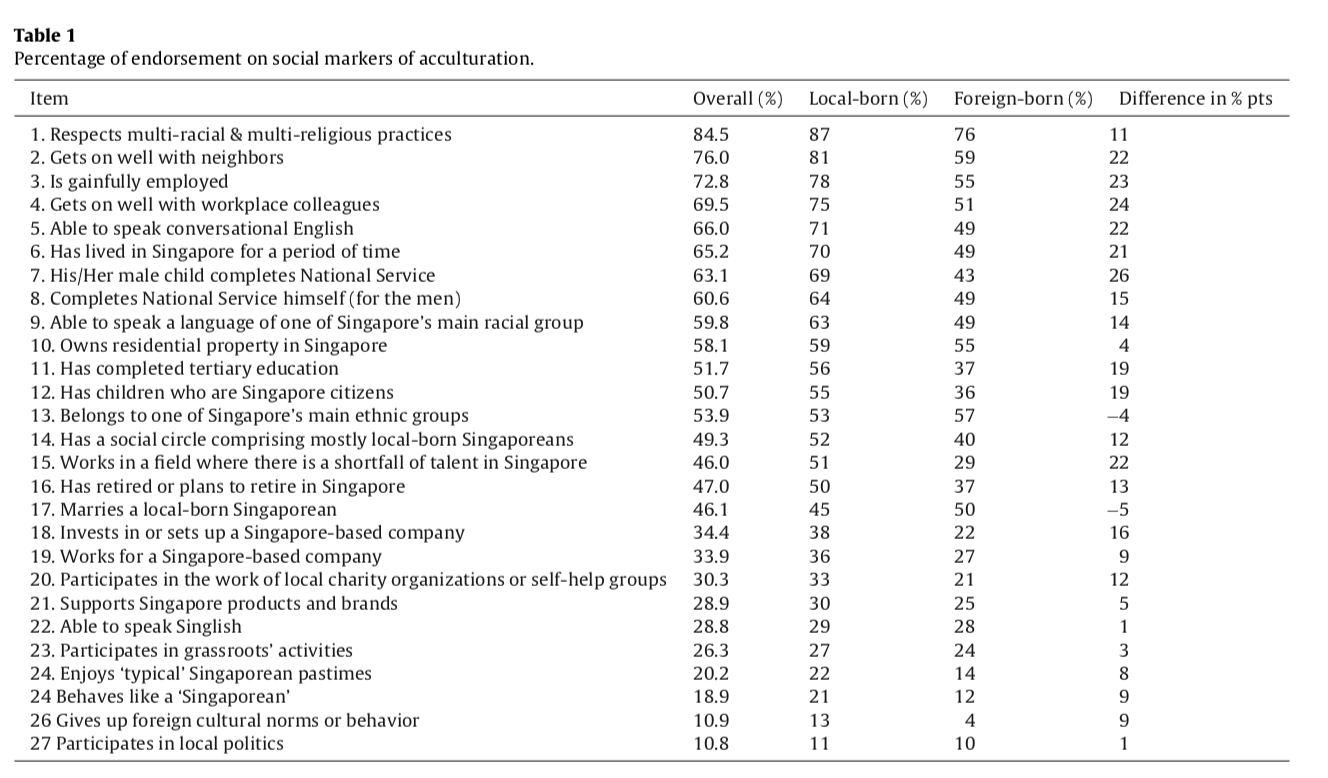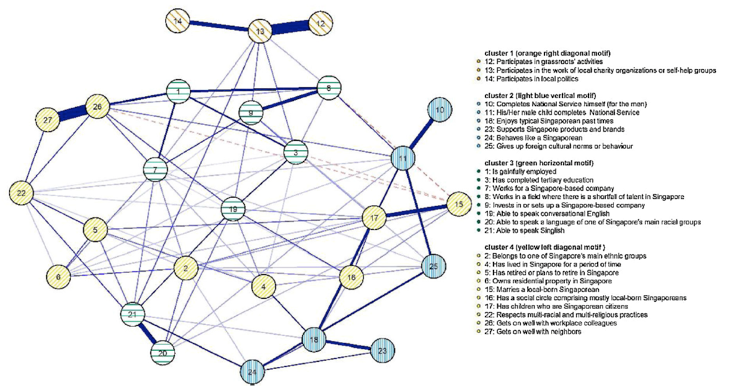Globalisation and transnational movement of labour has for centuries shaped our demographic landscape. But in recent years, through economic uncertainty and the rise of far-right political movements, not to mention the COVID-19 pandemic that has resulted in countries rapidly closing their borders, our social world is quickly shrinking. As countries are redefining the boundaries of their national identity and inclusion, the barriers to becoming accepted as an immigrant are suddenly becoming more stringent. As an “outsider”, you are now expected to conform to very specific socio-behavioural characteristics before you can be embraced as a member of the national in-group. So, this begets the question. Beyond simply holding the passport, what else does it take to be accepted as “one of us” in Singapore today?
But first, what is national identity and why does it matter? National identity is a sense of a nation as a cohesive entity, one that consists of distinctive and diverse traditions, cultures and languages. It is a consistent and congruent set of values, attitudes and behaviours that defines a person as a citizen of their country. It is pivotal to the fortunes of nations as it helps to ensure good governance, assist with economic development, and unite members of a society. And ultimately, it also taps into the one fundamental and primal desire of humans – to belong.
Ethnic or civic?
National identity can be divided into two parts. Ethnic and civic. An ethnic identity is based on ascribed social identity marks that are relatively immutable, and its boundaries are considered to be far less porous. Examples of such indicators include that of ethnicity, country of birth, and religion. If a country endorses an ethnic identity, they are more likely to reject the idea of multiculturalism, and be more adverse towards immigration.
On the other hand, we have a civic identity. It is composed of non-exclusive indicators that anyone can usually achieve. This could include factors such as showing respect for local customs, following the law and fulfilling certain obligations as a member of that society. Countries that do endorse a civic identity tend to be open to greater social diversity, as they are more tolerant and inclusive to cultural polarity.
One way of assessing a national identity is through social markers of everyday citizenship, which can be either ethnic or civic in nature. These are indicators, acts, and behaviours that are present in our daily routines and rituals. They could range from dressing like a local, eating local food, to taking part in local activities. A perfect Singaporean example? Singlish and the perspectives that surround it. Singaporeans who are able to switch between English and Singlish are often perceived to be of a higher social status than those who speak exclusively in Singlish, while those who do not speak Singlish are seen as posh, or even worse, not true Singaporeans. Respecting and adhering to the “Chope” culture is also an instance that springs to mind.
Another prominent example would be Japan. In a society that puts great emphasis on understanding and conforming to social norms, language and communication become crucial factors for acceptance. This means that in order for an immigrant to be accepted by the Japanese, they would be required to speak and write the language. Interestingly and contrary to popular stereotypes, the Japanese actually regard social and linguistic skills as a form of civic identity. Thus, being accepted presents itself as an achievable task for foreigners living in Japan.
Welcome to Singapore. Please do and think like this.
So, which social markers are deemed important to become a Singaporean? Associate Professor Leong Chan-Hoong, at the Centre for Applied Research, SUSS, has studied this subject for close to 10 years. In his research paper published in 2014, it was reported that both local and foreign-born Singapore citizens polled agreed that respect for multi-racial and multi-religious practices are most critical of being and becoming a Singaporean.

Figure 1: Percentage of endorsement on social markers of acculturation[1]
This should perhaps come as no surprise, considering the demographic and geographic nature of the country, and government policies such as the Ethnic Integration Policy (EIP) for public housing. After all, as one of the smallest nations in the world and one of the most religiously diverse, racial harmony and getting along with each other are crucial for Singapore to prosper.
Another interesting observation would be that of National Service, the bedrock of our national security and crucial for countries with small populations. It has gradually evolved to be regarded as a rite of passage, and we have seen this narrative played out everywhere in books, newspapers and movies such as Ah Boys To Men. This sentiment is even echoed by President Halimah Yacob, who has two sons who served, stating that National Service contributed to her sons’ growth and development, and that many parents would have also witnessed this transformation in their sons as well[2]. Thus, immigrants, or at least their male children, are expected to follow suit. Fascinatingly, this particular social marker had the biggest discrepancy between the local-born and foreign-born groups, standing at 26%.
It should also be noted that the concept of national identity and its impact on social inclusion is not homogenous. Some identity markers, regardless of being ethnic or civic in nature, are more enduring and influential than others in selected demographic groups. Using advanced network analyses and model simulation, a recent study found that participation in local charity organisations (i.e., item 13 in the below figure) has the greatest impact on how Singapore citizenship is defined. Moreover, a simulation of change on this marker produces the largest improvement in the construction of national identity. In other words, it is the most influential criteria in deciding if an immigrant is “one of us”. This finding however, is only valid for respondents born before Singapore’s independence in 1965. This emphasis on a communal self-support spirit is perhaps forged by shared memories of how the city-state struggled during the early years of nation building[3].

Figure 2: National identity network of individuals born after Singapore’s independence. Solid (or blue) lines denote positive associations between the identity markers and dotted (or red) lines denote negative associations.
In the end, we should remember that our national identity is dynamic, not static. Over time, with the influx of new people and ideas, alongside global events, what Singaporeans believe to be important will constantly grow. As Singapore is dependent on people as a resource, and with falling birth rates, there will always be room for immigrants, and with that, new cultures, traditions and practices that eventually will be woven into the fabric of what it means to be Singaporean. Perhaps Prime Minister Lee Hsien-Loong says it best, stating that “Being Singaporean has never been a matter of subtraction, but of addition; not of becoming less, but more; not of limitation and contraction, but of openness and expansion[4].”
This article is an adaptation of the podcast “What does it take to become ‘One of Us?’ How Recipient Culture Shapes National Identity and Inclusion (Part Two)” and a series of scientific papers published in a Special Issue (vol 78) of the International Journal of Intercultural Relations, by Associate Professor Leong Chan-Hoong, SUSS, Centre for Applied Research.
[1] Leong, C.H. (2014) Social Markers of Acculturation: A New Research Framework on International Adaptation. International Journal of Intercultural Relations, 38(1), 120-132.
[2] Straits Times (JAN 2018) National service the backbone of our national defence: President Halimah
[3] Phua, D., Leong, C.H. & Hong, Y.Y. (2020) Heterogeneity in national identity construct: Example of Singapore using network analysis. International Journal of Intercultural Relations, 78, 20-32.
[4] Straits Times (MAY 2017) Singaporeans have evolved a distinctive identity: PM Lee Hsien Loong